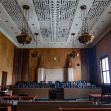College students accused of misconduct do not have the same rights as criminal defendants, according to the California Supreme Court. The court ruled that private university students can face discipline, including expulsion, without first having the right to cross-examine their accusers in a live hearing.
The decision stems from accusations brought against a University of Southern California student. The student, a member of the football team, allegedly assaulted his ex-girlfriend by grabbing her hair and neck and hitting her head against an alley wall. USC investigated the allegations and held an evidentiary hearing, ultimately finding that the student violated the school’s policy against intimate partner violence. He was expelled.
The student sought to overturn his expulsion in court, arguing that he was deprived of a “fair trial” because was not permitted to cross-examine his accuser or other witnesses at a live hearing. The California Supreme Court ruled that private university students have no such right.
The court ruled that, “though private universities are required to comply with the common law doctrine of fair procedure by providing accused students with notice of the charges and a
meaningful opportunity to be heard,” colleges are not required to give students the opportunity to “directly or indirectly cross-examine the accuser and other witnesses at a live hearing with the accused student in attendance.” Universities are free to set their own procedures for investigating claims of misconduct and act accordingly, so long as students are given “adequate notice and a meaningful opportunity to be heard.”
The Court’s ruling overturned a 2017 appellate decision in the student’s favor. That 2017 decision became wrapped up in a national debate over Title IX and campus assault investigations. Title IX refers to the federal civil rights law that prohibits sex-based discrimination in schools and universities.
Then-U.S. Secretary of Education Betsy DeVos pointed to the case as evidence that universities were not giving students accused of sexual harassment, assault, and other misconduct a fair chance to defend themselves. DeVos then overhauled Title IX regulations, requiring colleges to allow students to cross-examine their accusers at live hearings.
Women’s advocacy organizations strongly opposed the changes to Title IX, arguing that they discourage victims from coming forward. Survivors of sexual harassment and sexual assault, they said, should not be forced to confront their abusers directly and re-live that trauma.
Echoing those concerns, the California Supreme Court’s ruling encouraged universities to craft disciplinary processes that would “not only provide the accused student a meaningful opportunity to be heard, but also embolden victims to report incidents of sexual misconduct or intimate partner violence.”
The revised Title IX requirements were implemented in 2020 and remain in place today. Because they were implemented after the USC incident, however, they did not impact the CA Supreme Court’s decision.
The Biden administration has since released a draft of its own Title IX overhaul, which would discard the live hearing requirement and expand the types of incidents that universities are required to investigate. The final version of those regulations has yet to be implemented.
California, meanwhile, acted on its own to enhance Title IX protections on campus. In September 2020, Governor Newsom signed into law Senate Bill 493, which requires universities to implement policies and procedures to reduce the incidence of campus sexual harassment and sexual assault. Among other things, SB 493 set standards for investigations and hearings regarding sexual misconduct allegations. As pointed out by the California Supreme Court, SB 493 “does not require universities to conduct live hearings featuring cross-examination of the accuser and other witnesses.”






